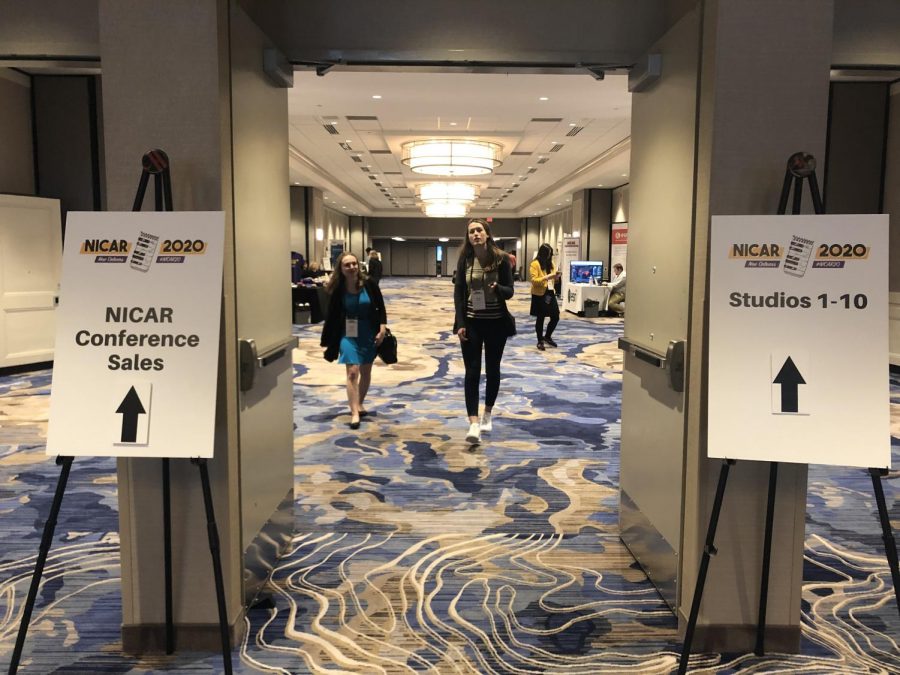New Orleans tourism industry braces for coronavirus impact
Attendees of the 2020 NICAR journalism conference in New Orleans were instructed to wash their hands often and refrain from shaking hands. Two conferences planned for later this month have already been cancelled by organizers due to growing concerns of the coronavirus.
March 8, 2020
Amid growing health concerns related to the COVID-19 outbreak, the New Orleans tourism industry is bracing for potential impact.
With the city’s millions of annual tourists and festival season in full swing, conference organizers and hotel and cruise companies are cautiously proceeding as normal, even as reported cases of the disease continue to rise each day, and experts agree it’s only a matter of time before coronavirus finds its way to Louisiana.
On Monday, March 9, the first case of ‘presumptive’ coronavirus was confirmed in Louisiana.
And as cases continue to spread, some companies aren’t taking any chances. Two conferences scheduled for later this month have been canceled by their organizers — the World Petrochemical Conference and a smaller technology conference.
But the general sense among tourism industry workers across the city is one of uncertainty.
“I can’t speculate on what coronavirus will do to New Orleans, but just like every other popular destination city, it is not having a positive impact on ours,” said Kristian Sonnier, vice president of communications and public relations for New Orleans & Company.
He stressed that, at present, there is no reason to cancel plans to travel to or attend events in New Orleans, and that coronavirus risk levels remain low, according to federal, state and local health experts.
“Regardless, some people are choosing not to travel or worse, cancelling their current travel plans,” Sonnier said. “This strains our economy and workforce and exacerbates the coronavirus situation.”
Another cause of concern lies in the city’s popular port — the sixth largest in the country — and the hundreds of thousands of cruise passengers that frequent the port annually.
Jessica Ragusa, communications manager for the Port of New Orleans said the port is actively monitoring the evolving situation and remains in constant communication with public health agencies and industry partners.
Over the weekend, the Centers for Disease Controls and Prevention started recommending that travelers avoid cruise ship travel worldwide. According to the CDC, cruise ship passengers are at increased risk of person-to-person spread of COVID-19.
This isn’t the first time the port has dealt with concerns of an outbreak, and Ragusa said employees are taking the same precautions they did during the SARS and Ebola outbreaks.
Each embarkation agency administers a questionnaire that all passengers must fill out before boarding the ship. If warranted, there is a second-level screening to determine if a guest can sail or not.
Ragusa said the port’s cruise partners are coordinating with the CDC and the World Health Organization, implementing enhanced screening and prevention measures that will include denying boarding for people who recently visited the epicenter of the disease.
Last month a two-week quarantine of a cruise ship off the coast of Japan, The Diamond Princess, resulted in more than 700 cases of the coronavirus.
Closer to home, hotel industry workers are cautiously proceeding with business as usual.
Adam Miller, special events planner for the Columns Hotel, believes the hotel’s typically local clientele means people will be less likely to cancel reservations or stay away.
“We’re the type of property where I don’t think we’re actually going to see any effect from it because of the demographics of our business,” Miller said.
Still, he said, within the industry he has heard that hotels and restaurants are taking measures to prepare.
“A bar/restaurant said for a while they might just be working from non-glass product, paper and recyclable products because of the concern of transmitting it through glassware.
Julia Stroble, corporate director of sales and revenue management for BN Hotels echoed his sentiments.
Her company operates limited-service hotels on the West Bank and in Chalmette.
“We’re in a suburban market, it’s not as big an issue,” Stroble said. “We’re not getting large conventions. If I did have conventions I think that would definitely be an issue.
While she said she feels relatively insulated from any disruption, she said it would be problematic if governmental military travel was canceled, as her company’s hotels are located near military bases.
“If the government stops traveling, then I’m going to be in big trouble,” she said. “But so far we haven’t seen any deterrence in military travel.”
Her second concern is one that is on the mind of many tourism workers as festival season intensifies.
“The biggest concerns that I have…is if they start messing with BUKU and Jazz Fest festivals,” Stroble said. “Despite AirBnB and all of that, they’re still high-demand events that give me high occupancy, so if those things start to slack off, that will affect me.”
Organizers of both festivals and the French Quarter Festival said for now, all are still on track while organizers continue to monitor the situation.








